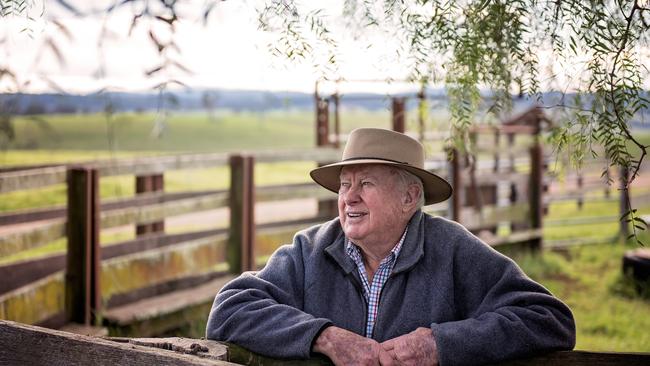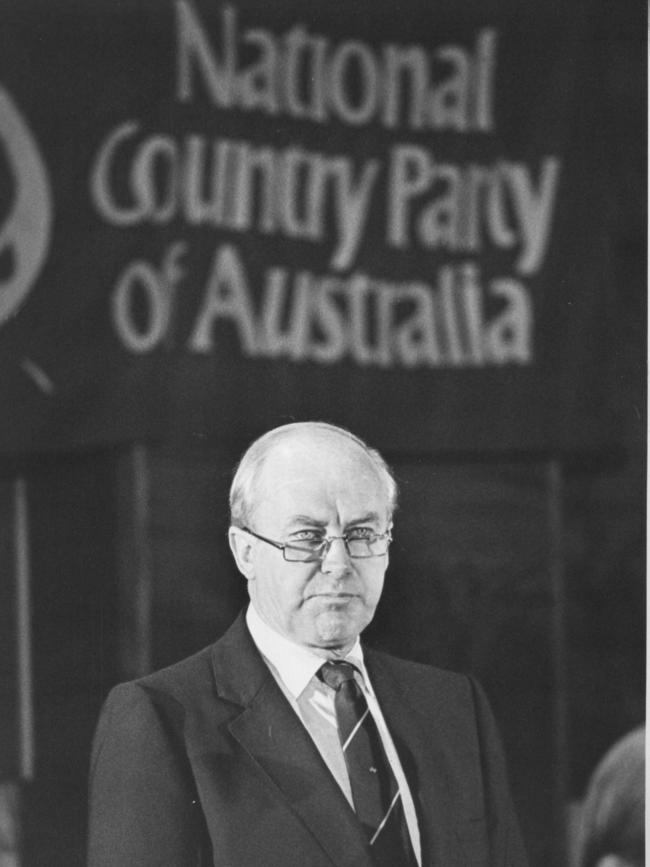Peter Nixon: Calls for support on Australian dairy sector reform
After a stint out of the limelight, former National Party politician Peter Nixon is back to put his support behind a plan to save the dairy industry.

Every political party has a living legend that never became leader but whose accomplishments trump many of those who clinched the top job.
Labor has Barry Jones, Jenny Macklin and Gareth Evans. The Liberal Party has Peter Costello, Julie Bishop and Fred Chaney.
But when it comes to that unofficial title of “best leader they never had” in the National Party, no Nat is in any doubt of the titleholder.
Peter James Nixon.
At 93 years of age, the young dairy farmer who went on to notch up an impressive ministerial record has largely shunned the limelight in recent years.
But he’s back on one last political fight — to back a plan to save an industry that kicked off his career, continues to feed a nation and which he considers in existential jeopardy.
The Dahlsen plan, launched by veteran businessman John Dahlsen last year, outlines a path to consistent profitability — no mean feat in a sector akin to a financial rollercoaster.
Mr Dahlsen’s plan involves a 40 cents per litre levy on all milk sold in Australia — from standard white to UHT to flavoured varieties.
His report released last year argues Australian milk is the cheapest in the world and a 40c per litre rise would bring it closer to the global average of $1.70 per litre — still well below many other industrialised nations.
The former HWT and Woolworths chairman (who is related by marriage to Mr Nixon) argues government should be a driving force behind the change with the Australian Competition and Consumer Commission providing oversight to ensure the dairy sector’s long-term sustainability.
“There are big problems in dairy to address; huge problems to address, but government and elements of the sector are dodging the tough questions,” Mr Nixon said.
“My role, at a basic level, when I was Minister for Primary Industries, was to look at the problem and find solutions. The dairy industry has huge problems and has for some time, even if it’s enjoying one good season.”
“(This) plan just doesn’t talk about the problem; it provides solutions.”
Born in 1928, milk flows through Mr Nixon’s blood.
His great-grandfather James Nixon was the inaugural chairman of Orbost Butter and Produce Company.
The blend of dairy and leadership ran down the family line.
Mr Nixon was in his early 30s when he was elected to Federal Parliament in 1961. The new Gippsland MP was in awe of then PM Robert Menzies, and the grand man himself gave plenty of encouragement to the fledgling politician.
On the occasion of one of his first speeches, Menzies praised the young Nixon for taking up only 12 of his 20 allocated minutes, as a gentle reprimand to a more loquacious MP.
Menzies asked Nixon if he was nervous on his first day in the House of Representatives. “Dreadfully,” he replied. The PM said: “you will always be the same and if you are not, you will not do justice to the big occasions.”
As the 1960s rolled on, Mr Nixon entered cabinet and saw first hand how the nation’s leader operated. He describes the ill-fated Harold Holt (PM 1966-67) as “one of life’s gentlemen.”
Maverick John Gorton, who served for three years (1968-71) in the wake of Holt’s disappearance, was: “a character. A larger-than-life figure, who had a wonderful way for sensing the public mood.”
Arguably, Mr Nixon’s political apex was reached as Minister for Primary Industry between 1979 and 1983.
He said the difference between his time as minister and the current generation of politicians is that they don’t know how to play hardball when negotiating international trade.
He cites former WTO director, Professor Gary Sampson’s backing of the Dahlsen plan’s international trade credentials, as underscoring that point.
“Australia has been naive in its handling of the WTO,” Mr Nixon said. “Every other country use a variety of methods to let their primary producers get around the rules. We’re using a holier-than-thou approach and it’s doing little for the long-term future of the Australian dairy farmer.”
The lifelong Nat reckons the National Party is at its best when it is taking up the fight for improved agricultural policy to its Liberal Party colleagues.
Mr Nixon recalled how he and fellow Country Party legends Doug Anthony and Ian Sinclair kicked goal after policy goal during the Fraser years, all the while maintaining the friendship of the PM.

He says that example is something he hopes reinstated Deputy PM Barnaby Joyce emulates.
“Barnaby Joyce has got the guts to do something, if he knows about it,” Mr Nixon said. “Whether the Minister for Agriculture (Mr Littleproud) has got any interest in it, God knows.”
The Weekly Times contacted the offices of Mr Joyce, Senator Bridget McKenzie and Mr Nixon’s successor as Member for Gippsland, Darren Chester.
Both Senator McKenzie and Mr Chester did not respond.
However, a spokeswoman for Mr Joyce said: “The Deputy Prime Minister has great respect for Mr Nixon and his contribution to the agriculture sector during his tenure as Minister, and is always open to hearing ideas.
“The dairy industry has changed dramatically over the last number of years and the Government believes a mandatory levy will disadvantage the dairy industry overall.”
The political veteran’s son Chris Nixon, is well-known in agri-politics in his own right. The dairy and beef farmer has served as president of the Victorian Farmers Federation livestock group and echoes his father’s concerns.
“Ten years ago, the dairy industry had 5000 to 6000 farms here in Victoria. Now, it’s only 5000 nationally,” Chris Nixon said.
“So it’s in a downward spiral. The big farms will operate but on ever decreasing margins and the small family farms will fall by the wayside. It takes a plethora of family farms to make a community — that will be lost if current trends continue.”
Both Nixon senior and junior say Australia’s dairy leaders need to present a unified front backing the Dahlsen plan if it has any hope of gaining traction in Canberra.





